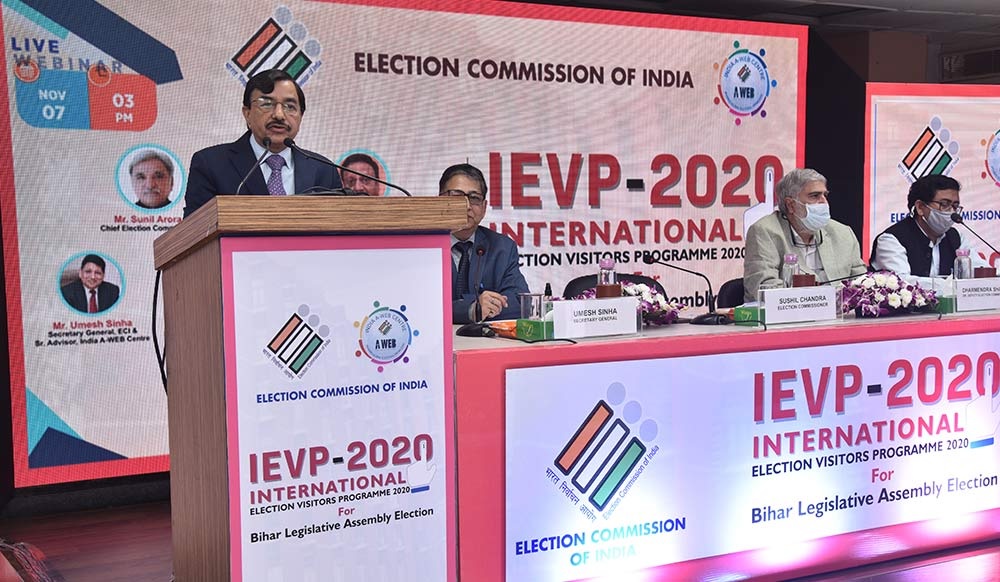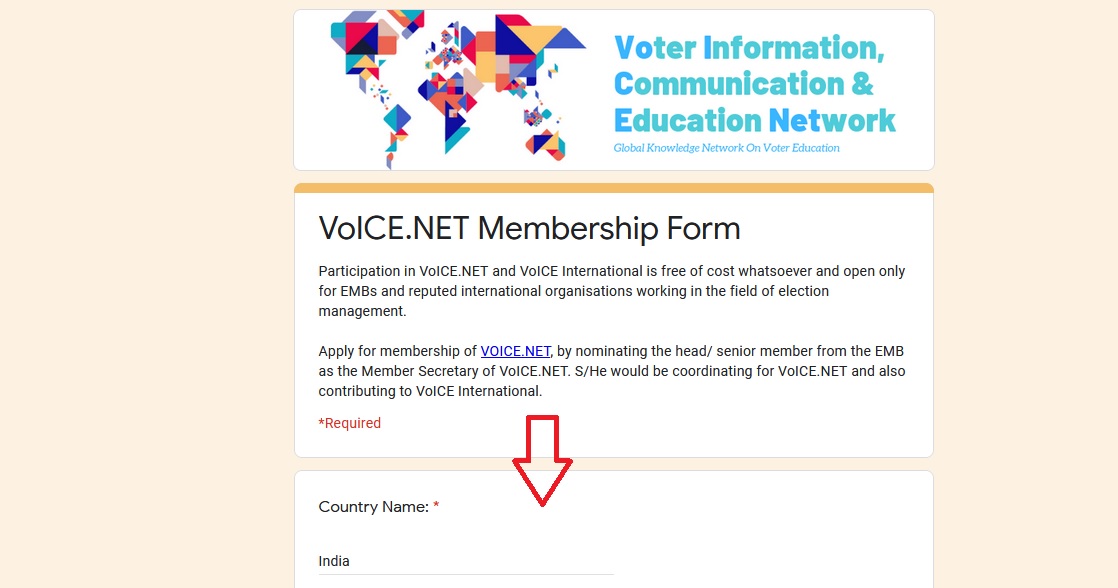ECI VoICE.NET Membership Form : Election Commission of India
Organisation : Election Commission of India
Facility Name : Voter Information, Communication & Education Network (VoICE.NET) Membership
Applicable For : EMBs and reputed international organisations
Website : http://voicenet.in/
VoICE.NET Membership
Participation in VoICE.NET and VoICE International is free of cost whatsoever and open only for EMBs and reputed international organisations working in the field of election management.

Apply for membership of VOICE.NET, by nominating the head/ senior member from the EMB as the Member Secretary of VoICE.NET. S/He would be coordinating for VoICE.NET and also contributing to VoICE International.
How To Apply For VoICE.NET Membership?
Just follow the simple steps mentioned below to apply for VoICE.NET Membership
Step-1 : Go to the link https://docs.google.com/forms/d/e/1FAIpQLSebQ-7S4j7LQl3sWVPfrs37tzOH6paQcwVU6FYLEHIhXnAbRg/viewform
Step-2 : Enter the Country Name
Step-3 : Enter the Country Capital City
Step-4 : Enter the Name of the Electoral Management Body (EMB)
Step-5 : Enter the Postal Address
Step-6 : Enter the Name & Designation of the Head of the EMB
Step-7 : Enter the Name & Designation of the member nominated as VoICE.NET Representative
Step-8 : Enter the E-mail (VoICE.NET Representative)
Step-9 : Enter the Phone (VoICE.NET Representative)
Step-10 : Click on Submit button

Communication Guidelines For EMBs During COVID-19 Crisis
The decision to hold or postpone scheduled elections during the novel corona virus disease (COVID-19) outbreak can be the equivalent to choosing between life and death, for people but also for democracies. When it comes to priorities, the health of the population should indisputably come first, closely followed by the health of democracy.
Within the context of the COVID-19 pandemic, the capacity of state institutions to utilize rapid mechanisms for collecting, processing and analysing information as the foundation of the decision-making process is as vital as the timely implementation of the appropriate communication strategies.
In the absence of proper communication, the restrictive measures imposed by many states to contain the spread of the virus do nothing but stoke public fear, now increasingly related to the (risk of permanent) loss of fundamental rights and liberties.
Disease and Disinformation:
Only a few months ago we were talking about disinformation at an unprecedented level when referring to the various online manipulation campaigns that targeted elections worldwide from 2016 onwards.
Amid the COVID-19 pandemic, what was previously diagnosed as information disorder evolved into an infodemic, making the mission of state institutions even harder while escalating individual fear into mass panic. The issue reached the most dangerous point when false information is disseminated from state leadership structures, generating confusion and distrust.
Citizens are in the position of having to distinguish between a high variety of data and information, often conflicting, under the pressure of time and fear. The concerted efforts made by social media and popular ICT platforms to fight both the virus and the surge of disinformation have not been able to fit the dimension of the problems so far, therefore free, independent and reliable media play an essential role in COVID-19 response effectiveness, as well as in maintaining a healthy democratic environment in times of crisis.
Proper Communication Builds Trust And Reduces Fear (Of Abuse):
** Trust is most valuable asset for a state institution, and it is highly correlated with the previous fulfillment of citizen’s expectations.
** It invests the authorities with the power to rapidly adopt and smoothly implement the necessary decisions.
** It helps make their voice heard above the (virtual) crowds, thus reducing the spread of false information and its potentially devastating consequences.
** It makes people accept the limitations to their rights more easily based on the certainty of gaining them back once the danger has been overcome.
Preliminary Action Points:
Whether a country held elections amid the COVID-19 crisis, decided to postpone them, opted for special voting arrangements, or has yet to decide, from a communication perspective, the EMBs should continue to function in crisis mode until normal electoral routines are reinstated.
Adjust the processes to fit the new context:
If an EMB does not have a designated structure to deal with crises, it should establish a cell or core group where representatives of the relevant departments within the organization can fulfil the needed functions and collaborate closely with the decision-making structure to inform its measures and adjust the communication strategy accordingly.
Due to the novelty of the disease, the crisis it generated is characterized by a very unpredictable dynamic. In such a context, it is not unusual for an EMB/institution to find itself in the position of contradicting in the morning the declarations made the evening before. Therefore, a rapid reaction mechanism should be put in place and include approval process, a clear chain of command, permanent access to the decision-making structure within the electoral management body, designated spokesperson.
Contact
Write to voicenet.eci@gmail.com for further details.